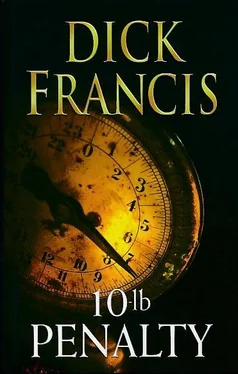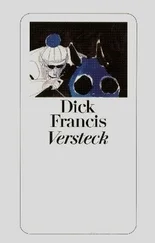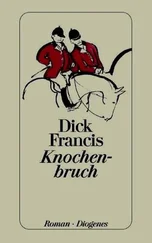Dick Francis - 10 lb Penalty
Здесь есть возможность читать онлайн «Dick Francis - 10 lb Penalty» весь текст электронной книги совершенно бесплатно (целиком полную версию без сокращений). В некоторых случаях можно слушать аудио, скачать через торрент в формате fb2 и присутствует краткое содержание. Город: London, Год выпуска: 1997, ISBN: 1997, Издательство: Michael Joseph, Жанр: Триллер, на английском языке. Описание произведения, (предисловие) а так же отзывы посетителей доступны на портале библиотеки ЛибКат.
- Название:10 lb Penalty
- Автор:
- Издательство:Michael Joseph
- Жанр:
- Год:1997
- Город:London
- ISBN:978-0-7181-4245-2
- Рейтинг книги:3 / 5. Голосов: 1
-
Избранное:Добавить в избранное
- Отзывы:
-
Ваша оценка:
- 60
- 1
- 2
- 3
- 4
- 5
10 lb Penalty: краткое содержание, описание и аннотация
Предлагаем к чтению аннотацию, описание, краткое содержание или предисловие (зависит от того, что написал сам автор книги «10 lb Penalty»). Если вы не нашли необходимую информацию о книге — напишите в комментариях, мы постараемся отыскать её.
10 lb Penalty — читать онлайн бесплатно полную книгу (весь текст) целиком
Ниже представлен текст книги, разбитый по страницам. Система сохранения места последней прочитанной страницы, позволяет с удобством читать онлайн бесплатно книгу «10 lb Penalty», без необходимости каждый раз заново искать на чём Вы остановились. Поставьте закладку, и сможете в любой момент перейти на страницу, на которой закончили чтение.
Интервал:
Закладка:
Samson Frazer came from the Hoopwestern Gazette with his cameraman and gave my horrified father extra details of how Usher Rudd had spent his Sunday.
Usher Rudd himself came — free, unrepentant, bitter-eyed and steaming with malice, glaring at my father and talking into a mobile phone.
When Joe Duke came, he looked at first aghast at the bustle and movement, but my father resignedly told him, as he joined us for coffee, that the hotel had been packed on the night we were reproducing, and the present crowd would make everything seem more real.
Moreover, my father said he would walk with me across the square as he had done before, and although I didn’t like the idea, Joe Duke nodded enthusiastically.
Why wait for midnight? people asked. Everyone was ready now, and now was eleven-thirty.
Because, Joe explained, half of the streetlights in the square switched off automatically at twelve o’clock, and if the reconstruction was to mean anything, the conditions had to be as near as possible to what they had been before.
Joe Duke brought in a bag of golf clubs from his car and showed everyone the long walking stick with the tartan cover that disguised it.
The manager frowned in puzzlement, and I wanted to ask him if he had remembered something significant, but Joe and the crowd swept all before them, anxious to get started. I would ask him later, I thought.
Midnight came. Half the lights in the square faded to darkness. All that were left glowing threw shadows on the cobbles. Over at the far side of the square a few lights showed dimly in the party headquarters and the charity shop.
When my father and I walked out into the square, the only lights blazing brightly were those of The Sleeping Dragon at our back.
It was planned that my father and I would walk halfway across the square and wait while Joe aimed his walking stick out of the window and yelled, “BANG,” and then reached or climbed up to put the stick in the gutter. People would hurry from The Sleeping Dragon towards my father, as they had done before.
It all felt alarmingly real to me, but everyone was smiling.
Joe, surrounded by encouraging crowds, turned to go towards the staircase while I and my father walked out across the cobbles. I stopped after a while to look back at the hotel but my father walked on, calling over his shoulder, “Come on, Ben, we haven’t reached the spot yet.”
I looked up at the hotel. Joe’s walking stick was pointing out of one of the windows, half hidden by the seemingly perpetual geraniums.
Three thoughts jammed into my consciousness simultaneously.
First, Joe hadn’t had time to get up the stairs and walk along to the lounge and hide behind the curtain.
Second, the stick was pointing out of the wrong window.
Third, there was a gleam on the stick and a hole, a black round hole in the end of it.
It wasn’t a stick. It was a gun.
My father was ten yards ahead of me across the square. I sprinted as I had for Orinda and for the technician in the presses, without pause, without thought, with raw intuition, and I jumped in a flying football tackle to knock my father down.
The bang was real enough. The bullet was real enough, but the happy crowd which poured out of the hotel still thought it was a game.
The bullet hit me while I was still in the air, jumping and colliding with my father, and it would have gone into his back if I hadn’t been there.
It entered high on my right thigh and traveled down inside my leg to the knee, the kinetic energy bursting apart all muscles and soft tissue in its path.
The force of it whirled me around so that when I crashed to the cobbles I was facing The Sleeping Dragon, half-lying, propped on my left elbow, shuddering throughout all my body with my brain disoriented and protesting with universal outrage.
There was enough pain everywhere to satisfy Joe Duke. My eyes watered with it and my skin sweated. I’d been injured now and then in racing falls, and I’d felt shivery and sore the night of the fire, but nothing had even begun to warn me that there was an unimaginable dimension far beyond cuts and breaks.
It didn’t really help that I knew the physics of high-velocity bullets and the damage they could do. I’d fired hundreds of them at targets. I shot in a world where all one hit was paper. I didn’t know that I’d ever be able to fire a rifle again.
My father was on his knees beside me, his face screwed up with anxiety. My right trouser leg was dark and saturated with blood. The crowd from The Sleeping Dragon were running now, with Polly at their head. I could hear her agonized voice: “George... oh, George.”
It was all right, I thought. It wasn’t George.
My father held my hand.
Besides the encompassing pain, I felt remarkably ill.
I wanted to lie down, to stand up, to move somehow, and I couldn’t. I wanted someone to come along and shoot me again, but in the head; to give me oblivion, like they did with horses.
Time passed. Nothing got better.
Although ordinary traffic was banned from the square, police cars, ambulances and fire engines weren’t. Two police cars and one ambulance arrived, roof lights flashing. People from the police cars went into the hotel. Someone from the ambulance came and, with large scissors, cut open my right trouser leg.
I went on wishing for oblivion.
My leg, exposed to the dim light in the square, looked literally a bloody mess. I gathered that the bullet hadn’t severed the femoral artery, because if it had I would have already bled to death. There was, however, somewhere in my mangled muscles, a hard white finger-shaped length of what I understood with shock to be bone. Femur. Uncovered, but also unbroken.
The man from the ambulance hid the devastation with a large padded dressing and went back to the ambulance. He’d gone to summon a doctor, my father said: there were all sorts of rules and regulations about gunshot wounds.
It didn’t cross my mind that I might lose my leg and, in fact, I didn’t. What I lost, once everything was stitched and repaired, was the strength to ride half-ton steeplechasers over the black birch. What I lost was speed.
People came out of the hotel and got into the police cars. One of them was Alderney Wyvern, in handcuffs.
When the cars had driven away, Joe Duke walked across the square and sat on his heels to talk to my father and me.
He said to me, “Can you take in what I’m saying?”
“Yes.”
Joe said, “When I went up the stairs to position the walking stick, the hotel manager hurried up after me and caught me before I reached the little lounge. He said he didn’t know if it was just a coincidence, but not long before, in fact at about eleven o’clock, a man had booked in as a guest at the hotel and he too was carrying a bag of golf clubs. And what was slightly odd about him, the manager said, was that he was wearing gloves.”
Joe stood up to stretch his legs for a moment, and then sat back on his heels. “Are you taking in what I’m saying?” he said.
“Yes,” I groggily replied.
“We heard that cracking bang of the gun going off, and the manager used his passkey to open a bedroom door, and inside we found Alderney Wyvern coming towards the door carrying his bag of golf clubs, but when the manager snatched it from him and emptied them out onto the floor, all that was in it was golf clubs.”
Joe went on, “He hadn’t had time to put the rifle up in the gutter, but it was there with him, all right. He’d put the gun butt in the hanging basket with the geraniums, with the barrel pointing skywards, among the chains hanging the basket. I then used the room telephone to bring my colleagues from the police station. While we waited for them to arrive I asked, out of curiosity, how Wyvern had known about the reconstruction. How had he known that he would have a chance to shoot George Juliard?”
Читать дальшеИнтервал:
Закладка:
Похожие книги на «10 lb Penalty»
Представляем Вашему вниманию похожие книги на «10 lb Penalty» списком для выбора. Мы отобрали схожую по названию и смыслу литературу в надежде предоставить читателям больше вариантов отыскать новые, интересные, ещё непрочитанные произведения.
Обсуждение, отзывы о книге «10 lb Penalty» и просто собственные мнения читателей. Оставьте ваши комментарии, напишите, что Вы думаете о произведении, его смысле или главных героях. Укажите что конкретно понравилось, а что нет, и почему Вы так считаете.












